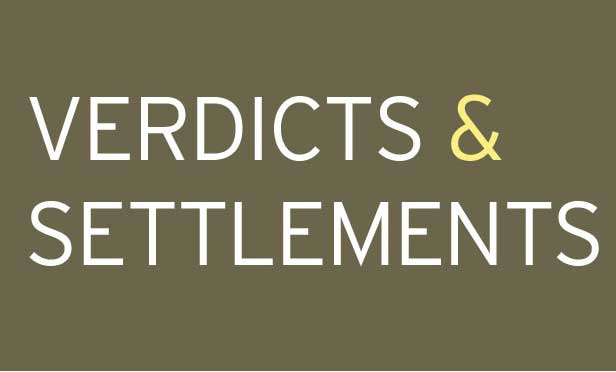Plaintiff Alleged Impaired Gait, Back Pain Due to Car Crash
On Feb. 5, 2016, plaintiff Eric Hollis, 43, a valet, was stopped at a red light on 16th Street, at its intersection with Arch Street, in Center City, when his sedan was rear-ended by a pickup truck. He claimed back injuries.
February 28, 2019 at 03:52 PM
4 minute read
Hollis v. Atkins
$700,000 Verdict
Date of Verdict: Jan. 9.
Court and Case No.: C.P. Philadelphia No. 170802642.
Judge: Sean F. Kennedy.
Type of Action: Motor vehicle.
Injuries: Leg, back, head injuries.
Plaintiffs Counsel: Justin K. Youkey, Spear, Greenfield, Richman, Weitz & Taggart, Philadelphia.
Plaintiffs Expert: Norman B. Stempler, orthopedic surgery, Bensalem.
Defense Counsel: Kristin M. Waller, Law Offices of Kenneth S. O'Neill, Philadelphia.
Defense Expert: Richard D. Lackman, orthopedic surgery, Camden, New Jersey.
Comment:
On Feb. 5, 2016, plaintiff Eric Hollis, 43, a valet, was stopped at a red light on 16th Street, at its intersection with Arch Street, in Center City, when his sedan was rear-ended by a pickup truck. He claimed back injuries.
Hollis sued the driver, Shawn Atkins. He alleged that Atkins was negligent in the operation of a vehicle.
Atkins stipulated to liability, and the case was tried on the issues of causation and damages.
Following the accident, Hollis drove himself to an emergency room where he was examined and diagnosed with a head contusion; he struck his head against the steering wheel. He was released with instructions to follow up with additional treatment.
On Feb. 15, Hollis presented to a rehabilitation facility with complaints of pain to his neck and back. Through July, he treated with 48 sessions of physical therapy, which included massage and exercise. During his course of treatment, he consulted with a pain-management physician, who prescribed him pain medication.
In June, he underwent MRIs and was diagnosed with a herniation at lumbar intervertebral disc L4-5, bilateral radiculopathy stemming from L4-5 and strains and sprains of his cervical, thoracic and lumbar spine. He further alleged experiencing numbness and tingling in his legs.
Following his completion of physical therapy, Hollis treated with home exercises and a TENS unit, but he continued to experience low-back complaints. In 2018, he was referred to an orthopedic surgeon, who determined that Hollis likely requires back surgery. No further treatment was administered.
Hollis' expert in orthopedic surgery causally related his injuries and treatment to the accident. According to the expert, Hollis suffered a permanent and serious impairment to his lumbar spine, and if his complaints continue, he likely will need surgery.
Hollis testified that he continues to suffer from low-back pain and numbness and tingling in his legs. According to Hollis, this causes him to suffer an impaired gait and an inability to sit for long periods. He stated that he requires assistance in his valet job at a condominium. In addition to parking vehicles, he carries luggage, packages and other heavy objects for its residents, all of which he has difficulty doing. He is unable to walk more than a block before taking a break. Hollis testified that he is exhausted after coming home from work, and as a result, he does not have much of a social life. He also said the can no longer work out at the gym and play basketball. He sought damages for past and future pain and suffering.
The defense maintained that there was only a small dent on Hollis' car and a couple of scratches on Atkins' truck following the collision. Moreover, Hollis was able to drive away from the accident scene and continues to drive the same vehicle at the time of trial. Atkins' counsel argued that the impact was minimal and could not have caused Hollis to suffer a serious impairment of a body function. The defense further questioned the severity of Hollis' injuries since he took up a second job, working an additional 10 hours a week.
The defense's expert in orthopedic surgery, who examined Hollis, opined that Hollis only suffered soft-tissue strains and sprains. According to the expert, the L4-5 herniation was degenerative and predated the accident. The expert concluded that Hollis did not suffer a serious impairment of a body function.
The jury found that Hollis' injuries were a serious impairment of a body function. He was determined to receive $700,000.
This report is based on information that was provided by plaintiffs counsel. Defense counsel did not respond to calls for comment.
—This report first appeared in VerdictSearch, an ALM publication.
This content has been archived. It is available through our partners, LexisNexis® and Bloomberg Law.
To view this content, please continue to their sites.
Not a Lexis Subscriber?
Subscribe Now
Not a Bloomberg Law Subscriber?
Subscribe Now
NOT FOR REPRINT
© 2025 ALM Global, LLC, All Rights Reserved. Request academic re-use from www.copyright.com. All other uses, submit a request to [email protected]. For more information visit Asset & Logo Licensing.
You Might Like
View All
Federal Judge Sides With Lyft Driver in Contractual Dispute Over $1M Uninsured Motorist Coverage
5 minute read
Federal Judge Sides With Insured in Dispute Over Nationwide's UIM 'Clarifications'
6 minute read
Judge Affirms $625K Jury Award to Car Salesman Accusing Phila. Dealership of Creating a Hostile Work Environment
6 minute readTrending Stories
- 122-Count Indictment Is Just the Start of SCOTUSBlog Atty's Legal Problems, Experts Say
- 2Judge Rejects Walgreens' Contractual Dispute Against Founder's Family Member
- 3FTC Sues PepsiCo for Alleged Price Break to Big-Box Retailer, Incurs Holyoak's Wrath
- 4Greenberg Traurig Litigation Co-Chair Returning After Three Years as US Attorney
- 5DC Circuit Rejects Jan. 6 Defendants’ Claim That Pepper Spray Isn't Dangerous Weapon
Who Got The Work
J. Brugh Lower of Gibbons has entered an appearance for industrial equipment supplier Devco Corporation in a pending trademark infringement lawsuit. The suit, accusing the defendant of selling knock-off Graco products, was filed Dec. 18 in New Jersey District Court by Rivkin Radler on behalf of Graco Inc. and Graco Minnesota. The case, assigned to U.S. District Judge Zahid N. Quraishi, is 3:24-cv-11294, Graco Inc. et al v. Devco Corporation.
Who Got The Work
Rebecca Maller-Stein and Kent A. Yalowitz of Arnold & Porter Kaye Scholer have entered their appearances for Hanaco Venture Capital and its executives, Lior Prosor and David Frankel, in a pending securities lawsuit. The action, filed on Dec. 24 in New York Southern District Court by Zell, Aron & Co. on behalf of Goldeneye Advisors, accuses the defendants of negligently and fraudulently managing the plaintiff's $1 million investment. The case, assigned to U.S. District Judge Vernon S. Broderick, is 1:24-cv-09918, Goldeneye Advisors, LLC v. Hanaco Venture Capital, Ltd. et al.
Who Got The Work
Attorneys from A&O Shearman has stepped in as defense counsel for Toronto-Dominion Bank and other defendants in a pending securities class action. The suit, filed Dec. 11 in New York Southern District Court by Bleichmar Fonti & Auld, accuses the defendants of concealing the bank's 'pervasive' deficiencies in regards to its compliance with the Bank Secrecy Act and the quality of its anti-money laundering controls. The case, assigned to U.S. District Judge Arun Subramanian, is 1:24-cv-09445, Gonzalez v. The Toronto-Dominion Bank et al.
Who Got The Work
Crown Castle International, a Pennsylvania company providing shared communications infrastructure, has turned to Luke D. Wolf of Gordon Rees Scully Mansukhani to fend off a pending breach-of-contract lawsuit. The court action, filed Nov. 25 in Michigan Eastern District Court by Hooper Hathaway PC on behalf of The Town Residences LLC, accuses Crown Castle of failing to transfer approximately $30,000 in utility payments from T-Mobile in breach of a roof-top lease and assignment agreement. The case, assigned to U.S. District Judge Susan K. Declercq, is 2:24-cv-13131, The Town Residences LLC v. T-Mobile US, Inc. et al.
Who Got The Work
Wilfred P. Coronato and Daniel M. Schwartz of McCarter & English have stepped in as defense counsel to Electrolux Home Products Inc. in a pending product liability lawsuit. The court action, filed Nov. 26 in New York Eastern District Court by Poulos Lopiccolo PC and Nagel Rice LLP on behalf of David Stern, alleges that the defendant's refrigerators’ drawers and shelving repeatedly break and fall apart within months after purchase. The case, assigned to U.S. District Judge Joan M. Azrack, is 2:24-cv-08204, Stern v. Electrolux Home Products, Inc.
Featured Firms
Law Offices of Gary Martin Hays & Associates, P.C.
(470) 294-1674
Law Offices of Mark E. Salomone
(857) 444-6468
Smith & Hassler
(713) 739-1250







